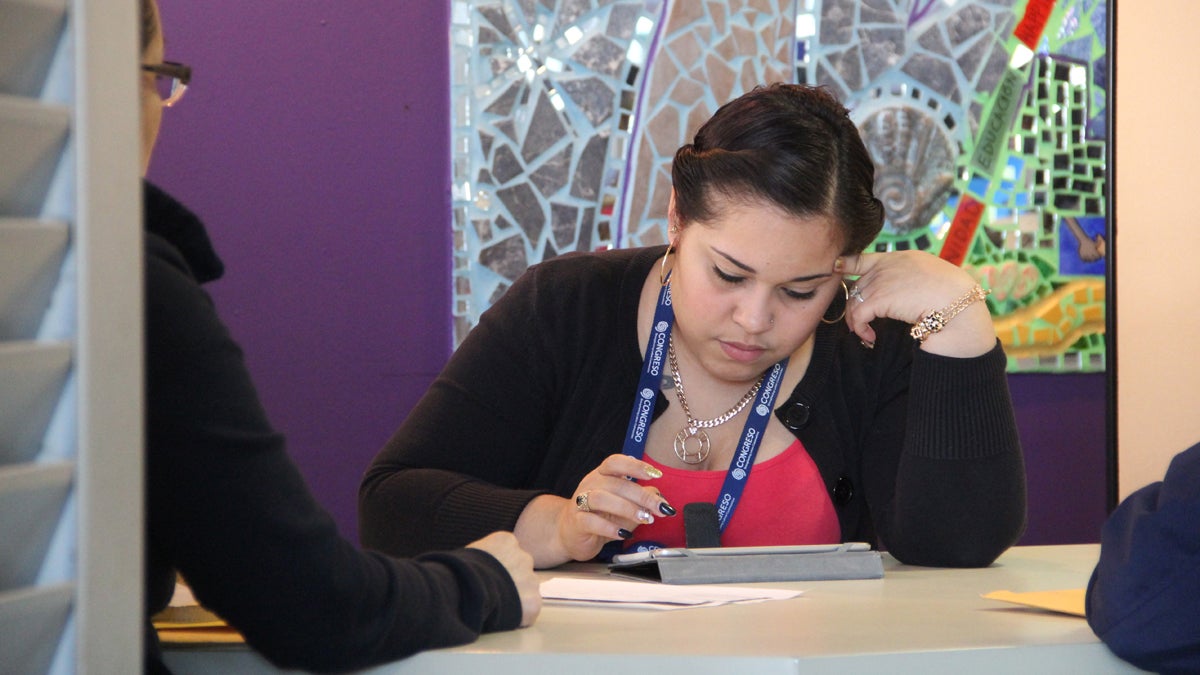La Ley de Asistencia Asequible: a look at the struggles and successes in Latino outreach during round two of open enrollment
Listen
'Adverse tiering' of drugs used to treat HIV/AIDS results in discrimination against AIDS patients in federal health exchanges, consumer advocates say. (NewsWorks file photo)
With the enrollment deadline for health insurance through the Affordable Care Act’s online marketplace quickly approaching, one group that could stand to benefit the most from the coverage option is Latinos, who make up about one third of the nation’s uninsured.
Even so, sign-ups have lagged.
Jose Plaza, national director for Latino engagement for Enroll America, says a key to reversing that trend is connecting with people in person, through community networks and enrollment events.
“We’re going to where the community is, hence we’re here in the middle of the thoroughfare,” says Plaza, who is standing in the lower level of Jefferson Station in Philadelphia, near some tables where people are meeting with application counselors.
Plaza came up from D.C. last Saturday to help out at one of the many outreach events slated during the final countdown to this year’s open enrollment deadline of February 15.
Latino enrollment got off to slow start during round one, making up about seven percent of overall sign-ups. This year enrollment appears to be lower in New Jersey, especially, compared to national trends and that of border states. Overall, Latinos still appear to make up a small portion of enrollments, about ten percent.
Plaza says he learned a lot from what happened last year.
“What we found was there were a couple challenges when it came to language,” says Plaza. “Also this cultural competence around health insurance and also understanding the benefits of health insurance.”
For many, there’s also the fear of drawing attention to family members who may be in the country illegally. In other cases, there’s unexpected additional paperwork involved with ID verification, which is more common for those without much of a credit history.
Plaza says all of this has led to new strategies during round two: simplifying language around health insurance, tailoring messages by region and community, doing more in-person outreach with community groups, working with spanish media outlets, and especially for younger generations, having some fun with social media.
Think silly gifs, memes and bilingual hashtags.
“Health care isn’t a sexy subject matter for anyone really, not just young people,” he says. “But finding different ways to make it attractive is what’s brought folks to click on a meme and then directly to the [health care] website.”
Spanish media has also been “the overriding messenger,” according to Pedro Rodriguez, an organizer for Enroll America in Philadelphia, who plugs the health law during his weekly talk show, Ritmo de la Communidad on 1340 AM.
Rodriguez says a lot of his work as an organizer has been focused on engaging local latino institutions and bringing assisters into the community in a way that didn’t exist last year.
Plaza, meanwhile, is hopeful all of these efforts are having an impact. Exact numbers are hard to pin down because most people don’t identify their race or ethnicity on applications, but federal estimates point to the latino uninsured rate going down this year by about seven percentage points.
“Latinos are around 32 percent of the total population that are uninsured, and we’ve seen that drop drastically,” he says, pointing out that more than 2.5 million Latinos have signed up for, or re-enrolled in, marketplace coverage.
For Aida Rivera, a health care organizer with New Jersey Citizen Action, the improvements are “not where we would want it to be.” More people are seeking her out with questions about health coverage, awareness and information have increased, but she says outreach continues to be a struggle.
“We just know there’s a huge gap.” she says. “There’s a lack of trust…The outreach just isn’t getting to a lot of people who still don’t know exactly what is Obamacare.”
For 20 year old Luis Ortiz, it wasn’t the clever memes or hashtags that brought him to Philadelphia’s Jefferson station last Saturday. It was an insistent roommate, who actually helped set up the event.
“He told me to come through and get health insurance because I really needed it,” says Ortiz, adding that insurance wasn’t something he’d really considered before, despite dealing with bills for an unplanned trip to the hospital for a sprained ankle.
He’d heard enrolling could take time and wondered about potential hidden expenses, even with low cost insurance.
“It [being covered] is not the one thing on my mind when I’m thinking about other things when I’m growing up.”
Ortiz says his parents spent most of their lives without insurance, so when he was younger if anyone ever got sick or hurt, the mindset was ‘it’ll get better, it’ll heal.’
He learned he’s now eligible for Pennsylvania’s new medicaid option.
As for Jose Plaza with Enroll America, he’s hoping that as more people like Ortiz gain coverage and experience the benefits, they’ll tell their friends and family about it. And it’s that word of mouth that he thinks will serve as the real secret weapon for success in increasing Latino enrollment in the months and years ahead.
WHYY is your source for fact-based, in-depth journalism and information. As a nonprofit organization, we rely on financial support from readers like you. Please give today.



